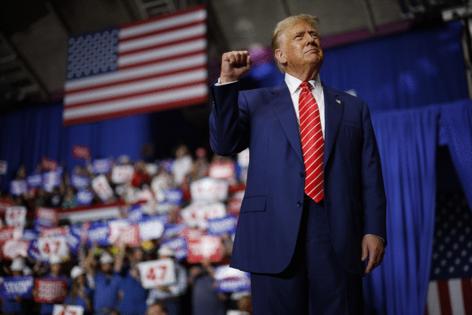Commentary: Trump's tariff plan would be a disaster
Published in Political News
Donald Trump, the former president, has proposed a 60% tariff on Chinese goods as part of his reelection campaign. It may sound like a show of strength, but it risks plunging the U.S. economy into deep trouble.
Instead of protecting American jobs and reducing dependence on China, tariffs often backfire by driving up prices, harming industries and impeding long-term economic goals.
One common misconception is that tariffs are a tax paid by foreign countries. In reality, the costs are paid by the importers and passed on to consumers. When the Trump administration imposed tariffs of up to 25% on most Chinese imports, the U.S. International Trade Commission found that prices for everyday goods — including electronics and furniture — rose by as much as 25%.
In addition, American-made goods that rely on Chinese components also saw price hikes, making them less competitive both in the United States and abroad. This undermines U.S. manufacturing, which has not reaped the promised benefits from these protectionist measures.
Another misleading promise is that tariffs reduce the trade deficit. After the Trump administration imposed tariffs, the nation’s trade deficit with China increased. Why? China retaliated by cutting back on purchases of U.S. goods, particularly agricultural products.
In fact, U.S. agricultural exports to China dropped by $26 billion from mid-2018 to the end of 2019. For farmers and rural communities already struggling with tight margins, this was a devastating blow.
Tariffs not only fail to bring back American jobs, they can even cost jobs by making manufacturing more expensive. As tariffs raise the cost of goods made with Chinese components, U.S. manufacturers are forced to either raise prices or cut jobs. Consumers may eventually find lower-cost items from foreign producers. Without other forms of domestic support, simply slapping tariffs on Chinese goods is not enough to restore American manufacturing.
While broad tariffs are harmful, they can be a useful tool for reducing dependence on China for goods essential to national security. For example, the U.S. military relies on Chinese components in key areas, such as industrial equipment, electronics, chemicals and transportation. Placing higher tariffs on these items could encourage production either domestically or in friendly nations with lower labor costs, such as India or Mexico.
This targeted approach — sometimes referred to as “friendshoring” — would reduce dependency on China while minimizing the economic impact. Building supply chains with trusted allies for critical components makes more sense than attempting to restore all production to the United States.
Tariffs on non-essential goods must be reconsidered. The 25% tariffs on most Chinese imports, set during the Trump administration, have caused more harm than benefit to the U.S. economy.
Raising them to 60%, as proposed by the Trump campaign, would be economically disastrous. Increases in the tariffs on solar panels, for example, would substantially raise prices and slow the adoption of clean technology. This not only hurts U.S. climate goals but undermines national security. The Defense Department and other experts have identified climate change as a major threat to national security.
It's time to reconsider how and where tariffs are applied. A blanket approach to tariffs, especially one as sweeping as a 60% tariff on Chinese imports, would damage the U.S. economy while failing to protect American jobs. Instead, a more strategic approach focused on securing supply chains in critical industries and partnering with trusted allies offers a path forward.
By balancing economic strength with national security priorities, we can ensure that the U.S. remains competitive without resorting to harmful protectionism.
____
Anita R Kellogg is an Assistant Professor of National Resource Studies at the Eisenhower School of the National Defense University. She is also the host of the Kellogg’s Global Politics podcast.
_____
©2024 Tribune Content Agency, LLC.




























































Comments